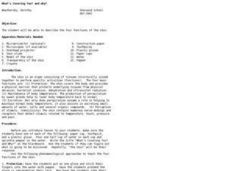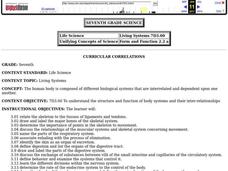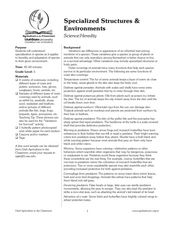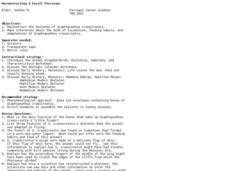Teach Engineering
Skin and the Effects of Ultraviolet Radiation
Though UV radiation can damage skin, it isn't all bad. The third installment in a six-part series allows the class to study the structure and function of skin. They learn about the different types of skin cancer and the SPF rating...
Curated OER
What's Covering You? and Why?
Students take a closer look at human skin. In this biology lesson plan, students describe the four functions of the skin as they complete a hands-on activity.
Curated OER
Decisions Today for a Healthy Tomorrow
Students explore a variety of factors that affect the health of the bone, muscle, and skin systems. Healthy lifestyle recommendations which include behaviors over which we have control are explored in this lesson.
Curated OER
Cells: Nature's Building Blocks
What you will find on this page is the general outline of a unit on the use of a microscope and the structure of the cell. There is no actual educational content here, so you will need to design the details of each of the four student...
Curated OER
Nerve Cell Informercials
Young scholars research the structure and function of the nervous system. They prepare a model or representation of neural transmission. Students create an infomercial about nerve cells.
Curated OER
Onion Skins
Students explore the structure of a plant cell. They carefully peel a single layer of onion skin from a slice of onion and stain it with methylene blue to observe the structures inside. They use a Digiscope connected to a computer to...
Curated OER
"Fish: Anatomy and Diversity in the Chesapeake Bay"
Students explore a variety of basic fish body form and their functions. They differentiate between different species of fish found in the Chesapeake Bay and St. Mary's River. In addition, they match pictures with descriptions using...
Curated OER
Hypothermia: Temperature Changes Under Varying Conditions
Students conduct an experiment to determine what type of clothing would be most suitable for outdoor activities. They determine the temperature changes of the skin under various wet clothing materials and graph the temperature changes. ...
Curated OER
The Synthesis of Some Organic Compounds And Their Representative Structures
Students examine how to represent organic compounds three-dimensionally. They write a synthesis reaction for three demonstrations, and construct a three-dimensional structure using a molecular modeling set.
Curated OER
Skeletal, Skin, and Muscular Systems
Eighth graders explain the functions of various body systems. Using a concept map, 8th graders identify and explain the fuctions of the skeletal, skin, and muscular systems of the body. After completing their concept map, students...
California Academy of Science
Fish Prints
What do a dead fish, conservation, and paint have in common? The answer is a great lesson about fish anatomy, fun print making techniques, and unsustainable fishing practices. The class will start by making fish prints with a...
Curated OER
Integumentary System
In this integumentary system worksheet, 9th graders list the two major layers of the skin and name the type of tissue composing each layer. Then they describe the structure and function of the hypodermis. Students also list three types...
University of Minnesota
Homeostasis of Thermoregulation
Whether you're battling the flu or trying to warm up on a chilly day, your body's ability to react to temperature change is fascinating! Anatomy scholars discover the fantastic feedback loops that control body temperature in a rigorous...
Curated OER
Human Body Systems
Seventh graders investigate the structure and function of body systems and their inter-relationships. They draw and label the major body systems, observe demonstrations of various body systems, define key vocabulary terms, and compare...
University of Colorado
Patterns and Fingerprints
Human fingerprint patterns are the result of layers of skin growing at different paces, thus causing the layers to pull on each other forming ridges. Here, groups of learners see how patterns and fingerprints assist scientists in a...
Curated OER
You...Instead of the Onion Skin
Students observe their own epithelial cells from the inside linings of their cheeks using DigiScope technology. They prepare a slide with both onion cells and epithelial cells and make an illustrated booklet for a PowerPoint presentation...
Cornell University
Shedding a "Little" Light on Cancer Surgery
Many types of cancer treatments now depend on nanotechnology—a big "little" discovery. Scholars begin by removing "malignant" tissue from simulated brains, one using fluorescent markers thanks to nanotechnology and one without. This...
Curated OER
What Makes Bones Strong?
Learners explore the function of bone, muscle, and skin. Pasta and rubber bands are used to model how minerals and collagen contribute to bone strength. The effects of the reduction of these substances are explored in chicken bones.
Curated OER
Specialized Structures and Environment
Fifth graders read about how different animals protect themselves, and how characteristics give animals an advantage in their environment. Students then discuss a variety of "outer" wear for humans, and what they might choose to wear in...
Serendip
UV, Mutations, and DNA Repair
How effective are cells at repairing UV damage? An inquiry-based lesson has learners experiment with organism by exposing them to various levels of UV light and then examining their DNA after a period of time. Pupils test different...
Curated OER
The Case of Regulation in Cells
After your biologists have learned about transcription, translation, and gene regulation, they work in a small group to create a poster of a system that serves as an analogy of the gene regulation process. They share their creations with...
Curated OER
Reconstructing a Fossil Pterosaur
Students reconstruct the skeleton of the fossil Scaphognathus crassirostis. In this fossil lesson plan, students discuss the Kingdoms of life, geologic history and the history of the skeletons of species. Students are given 20 minutes to...
Curated OER
Activities of the Immune System (Activity 1)
Students cut an apple in half and cover half with plastic wrap. They place drops of liquid on each half and discover how our skin protects us. They answer discussion questions to end the lesson.
Curated OER
Mapping the Homunculus
Students determine the relative number of nerve endings located in the skin. By calculating the reciprocal of these measurements, students have the appropriate data for predicting the relative size of the homunculus found on the cerebral...























